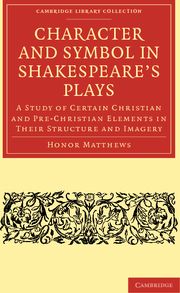 Character and Symbol in Shakespeare's Plays
Character and Symbol in Shakespeare's Plays Published online by Cambridge University Press: 07 September 2010
SOME TYPICAL FIGURES
Richard III; Henry IV; Macbeth; Claudius; Edmund
The compelling power of the Lucifer image is so marked that it becomes of interest to analyse the character of the men Shakespeare chooses to set before us as representatives of the arch-rebel. With the ambiguous figures of Henry V, Octavius, Brutus and Cassius set aside for separate consideration, there remains a homogeneous group with similar characteristics who all aspire to gain kingship by unlawful means, and who thus fulfil the familiar Luciferian role. In so doing they all deliberately ‘take degree away, untune that string’, and thus set loose for their own purposes forces of chaos entirely beyond their own control. Edmund, who is the most self-conscious and therefore articulate of them all, can legitimately be used in interpreting the others, for although he never achieves kingship he is clearly an aspirant to its power and very nearly a successful one. As the husband of either Goneril or Regan he would be king of half Britain, and if Albany's wife had successfully arranged her husband's ‘taking off’ Edmund would have been in a fair way to securing the absolute power he craved. Although Edmund declares:
Thou, nature, art my goddess; to thy law
My services are bound.
King Lear, I, ii, 1–2His conduct shows that in reality he is bound to nothing apart from his own desires, and that the only law he serves is his ‘own appetite’ with which he identifies Nature. To Edmund the bonds of blood are no more sacred than the bonds of allegiance.
To save this book to your Kindle, first ensure [email protected] is added to your Approved Personal Document E-mail List under your Personal Document Settings on the Manage Your Content and Devices page of your Amazon account. Then enter the ‘name’ part of your Kindle email address below. Find out more about saving to your Kindle.
Note you can select to save to either the @free.kindle.com or @kindle.com variations. ‘@free.kindle.com’ emails are free but can only be saved to your device when it is connected to wi-fi. ‘@kindle.com’ emails can be delivered even when you are not connected to wi-fi, but note that service fees apply.
Find out more about the Kindle Personal Document Service.
To save content items to your account, please confirm that you agree to abide by our usage policies. If this is the first time you use this feature, you will be asked to authorise Cambridge Core to connect with your account. Find out more about saving content to Dropbox.
To save content items to your account, please confirm that you agree to abide by our usage policies. If this is the first time you use this feature, you will be asked to authorise Cambridge Core to connect with your account. Find out more about saving content to Google Drive.